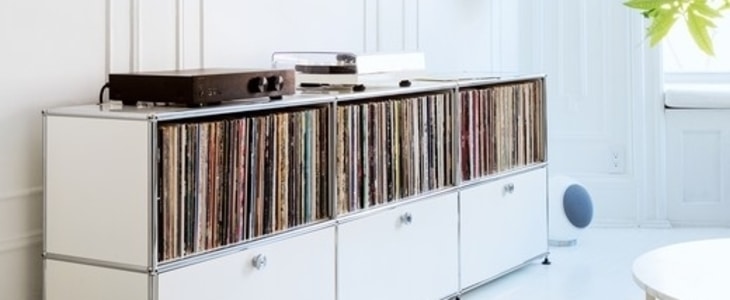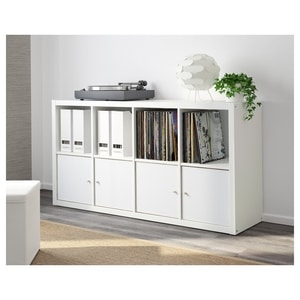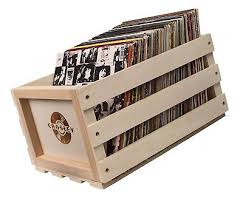
As vinyl collectors and music lovers, we need to make sure that our precious records don’t deteriorate in storage.
It is super key to store our albums the right way. So that the records keep sounding good. And so that the album covers keep looking good.
So how do we store vinyl records so they will last forever?
First and foremost, there are six important things that we need to know about vinyl storage:
- Vinyl records shall be stored vertically/upright
- Don’t store vinyl records in sunlight
- Vinyl records shall be stored reasonably cool and dry
- Don’t handle vinyl records with dirty/greasy fingers
- Store vinyl records in good quality inner and other sleeves
- Use suitable shelves or crates/boxes for vinyl storage
Let’s look at each of them in more detail. After that, we’ll discuss a few other important things to be aware of as well.
1. Vinyl records shall be stored vertically/upright
Alright, If I only could give you one tip about vinyl storage, this would be the one.
Store them vertically.
If records are stored on top of each other in a stack, they can become warped because of the pressure/weight of the stack on the records in the bottom of the stack. It can also damage the artwork on the album covers.
So never store records horizontally.
The solution is to find a good shelf or container where the records can be stored safely standing upright.
You will find many storage ideas and recommended products in our 11 Cool and Affordable Ways to Store Vinyl Records article.
2. Don’t store vinyl records in sunlight
Direct sunlight can deteriorate the album artwork on the album covers and heat-up the vinyl records so that they get soft and potentially warped.
Always keep your records away from direct sunlight.
Place your vinyl holding shelf or container by a wall that is not exposed to sunlight.
3. Vinyl records shall be stored reasonably cool and dry
Just as direct sunlight, heat can soften the vinyl and increase the risk of warped records. As they get softer when heated.
So if there is a room in your house that get really warm at times, it is not the best room for vinyl storage.
Also keep your vinyl record well clear of radiators, heaters, vents and anything else that potentially will put extra heat on the records.
Rooms (and basements) with high humidity and little air circulation is not ideal for vinyl storage either as the paper album covers get easily damaged in humid air.
4. Don’t handle vinyl records with dirty/greasy fingers
Make sure your records and album covers are neat and clean when put into storage. The most important part of that is to always wash your hands before handling records and covers.
Dirt and grease that are transferred from your hands to the records and covers can be hard to clean away after the records have been in storage for a while, so make sure they are clean when you put them away.
Dirty records will usually pop and crack and generally not sound good. So clean records are important.
5. Store vinyl records in good quality inner and other sleeves
To protect the record it self, as well as the album cover, good quality inner and outer selves is the way to go.
Good inner sleeves will keep your records clean and free from dust and static. They will also avoid print-through from the original sleeve.
It might sound like a hassle to replace the standard paper sleeves that usually comes with the record with a quality plastic inner sleeves. But it is truly worth it in the long run. Your records will be much better protected.
And protection is important!
Also, to protect the album artwork from dust, grease, dirt and friction damage when pulling them in and out from the shelf, good quality plastic (polyethylene) outer sleeves is a great investment. Your albums will look like new for a long long time if you protect them with good outer sleeves when in storage.
6. Use suitable shelves or crates/boxes for vinyl storage
When choosing furniture or a crate/box to store your records in, it is important to make sure that it lets us store the records upright, give at the records good support and room/air to breath.
Apple boxes and wine cases are okay. I do however not recommend to store records in any form of paper box as these boxes don’t give the best support, break easily and worst of all, it soaks up water and moisture and dissolves when wet.
The best way to go is a wooden shelf or a wooden crate.
A very popular shelf to use for vinyl record storage is the KALLAX shelf unit that can be bought at Ikea. It can hold many records, gives the records good support and room to breath. And it is not very expensive. This is the one I use to hold my albums.

Another option is a designated record crate. For flexibility, transportation and easy access it might be a better choice than a shelf.
A popular and cool looking one is the Crosley AC1004A-NA record storage crate that holds up to 75 albums.

When storing your albums, make sure to not pack them too tight. Rather give them a little air to breathe. That way you will avoid ring-wear and the covers will look good a lot longer.
Also, make sure to store 12-inch records and 7-inch records separately.
It is also a good idea to use proper wooden record dividers.

Record dividers will give the albums some additional support, reduce ring-wear and generally reduce wear and tear on the covers as you will find the album you are looking for more easily without having to pull lots of records in and out from the collection in search of the right one.
And it is just convenient.
What happens if vinyl records are not stored correctly?
It is basically three undesired things that can happen to our records if not stored correctly.
Firstly, the records can get warped if stored in a too hot environment or in sunlight. Especially if also stored in a stack on top of each other.
Secondly, the records can become noisy. And pop and crack when played.
And thirdly, the covers and the album artwork can (or will) deteriorate.
Be aware of heat when buying records
Leaving vinyl records in a car or in a mailbox that is baking in the sun is not a good idea. When baking in the sun the heat inside a car to a mailbox can reach temperatures where the vinyl gets soft and potentially warped.
So this is an issue that vinyl records share with good wine. Just as you should not leave a good bottle of wine in a car parked in the sun, vinyl records shouldn’t either.
Pick up your wine and vinyl at the last stop on your summer shopping round and you will be fine.
And if there is a record coming your way in the mail, make sure to be waiting for the mailman when the record arrives if there is a hot summer day and your mailbox is in the sun.
Bake potatoes. But not records.
Conclusion
Follow the simple guidelines outlined in this article, and your records will last for a long long time.
It is frustrating when a record we love start to sound bad. Or when really cool album artwork gets worn out and destroyed.
But with these simple guidelines, and without any major investments, our albums can be put safely to storage.
Related questions
Do vinyl records wear out? Records can get destroyed and worn out if you are playing them on a record player that have a worn out stylus, too high (or low) tracking weight or incorrect cartridge alignment. This might especially be an issue if you use a cheap suitcase-style record player. They tend to have way too high tracking force. Playing records on a good turntable with correct tracking force, correct alignment and a stylus that is not worn out will not damage the grooves.
How long does vinyl records last? If not played at all a vinyl record will pretty much last forever. If played on a good turntable with a good stylus, correct tracking force and correct cartridge alignment, the wear and tear on the record will be zero or slim to zero. In theory, the record will degrade with each play. But in real life, your records will probably outlast you and the ones that come after your if store according to the guidelines above and played on a correctly adjusted quality turntable.
References
The Library of Congress. Care, Handling, and Storage of Audio Visual Materials
